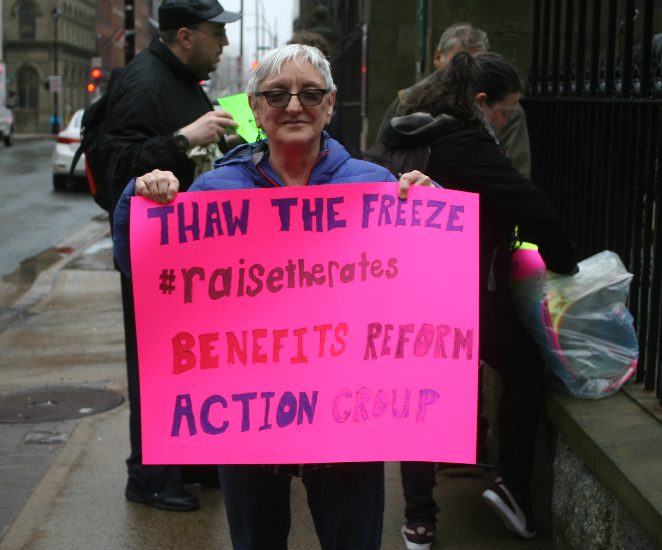KJIPUKTUK (Halifax) – Activists depending on income assistance in Nova Scotia are trying very hard to raise awareness about the incredibly difficult living conditions they have to deal with on a daily basis.
At times it seems like nobody is listening. And nobody is helping them.
Lately there have been modest signals that Nova Scotia’s labour movement at least is hearing them. There is a long way to go, but it’s something to build upon, and poverty advocates should pay attention.

Groups like ACORN Nova Scotia, the Benefits Reform Action Group (BRAG) and the Community Advocates Network, with memberships made up mostly of poor people, do what they can. They organize rallies, hold press conferences and panel discussions and organize.
They’re actually doing a great job, considering they do so on a shoestring budget, and with very little media support.
Maybe the labour movement is getting ready to step up to the plate.
For instance, this spring CUPE Nova Scotia members not only endorsed a $15 minimum wage, they also passed a resolution committing the union to pressure the Nova Scotia government to raise income assistance rates. And the Nova Scotia Federation of Labour has similar resolutions on the books, speaking to interests of the very poor, people who are unlikely to be card carrying union members.
For Nan McFadgen, president of CUPE Nova Scotia, it’s not that much of a stretch. “We have a lot of precarious workers among our members,”McFadgen says. “I know some of our members sometimes have to use the foodbank, some of our members are poor.”
“We need to raise everybody up, the entire community. It can never be a bad thing that we want to do this. One thing is for sure, the private market isn’t going to do it,” she says.
Danny Cavanagh, president of the Nova Scotia Federation of Labour (NSFL), also believes there is more of a role to play for the labour movement.
“We need to put more emphasis on the total elimination of poverty in the province. People must have a good level of assistance, just like we need good affordable housing and fewer landlords just getting rich off the poor. These need to be a goals that we set for our self as a labour movement,” Cavanagh says.
Better labour standards, fewer obstacles in the workplace for people living with disabilities, access to early learning and childcare, proper funding for literacy organizations, all these are issues that come into play here and that unions shouldn’t shy away from, Cavanagh says.
Both Cavanagh and McFadgen are still struggling to translate these ideas into sound and practical strategies that actually deliver. In terms of welfare right they tend to associate with the End Poverty Nova Scotia network, leaving more direct action- focused groups like BRAG and CAN-NS struggling on their own.
Past experiences with the fight for 15, the efforts to raise Nova Scotia’s minimum wage to a half decent level, have shown that such supports need to be sustained internally, Cavanagh says.
“There were huge public meetings three or four years ago around the fight for 15. A small coalition was formed, but after that, there were a couple of events, but nobody really took on a leadership role, and we didn’t actually approach people on minimum wage on why they need to join in this fight,” says Cavanagh.
“We want to work with more poverty organizations that are active in the province, we need to figure out how we work with them and help them take on a leadership role, says Cavanagh.
McFadgen agrees. “We can help them with logistics, with getting some pamphlets put together, figure out what the issues are, put a timeline and a plan to it, and start working.”
We requested an interview with a NSGEU spokesperson about these issues as well. After all, Community Services workers are NSGEU members, and former president Joan Jessome was an active supporter of anti poverty activism in the province. Unfortunately the union was not able to accommodate our request.
If you can, please support the Nova Scotia Advocate so that it can continue to cover issues such as poverty, racism, exclusion, workers’ rights and the environment in Nova Scotia. A pay wall is not an option since it would exclude many readers who don’t have any disposable income at all. We rely entirely on one-time donations and a tiny but mighty group of kindhearted monthly sustainers.



